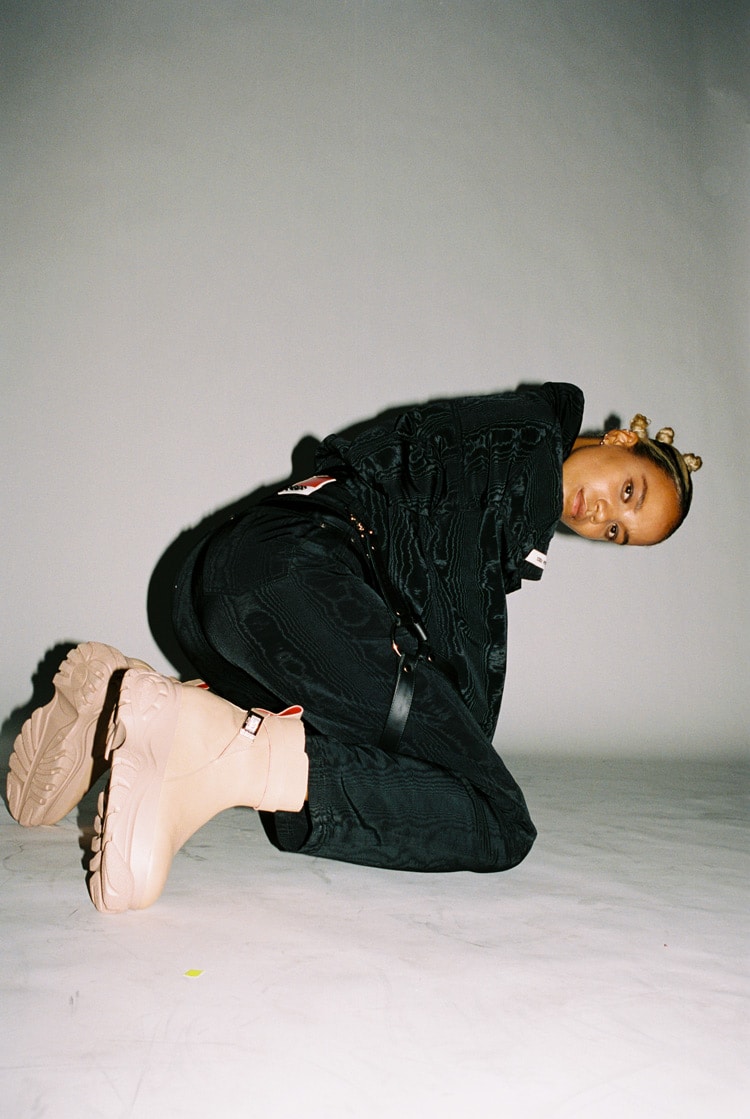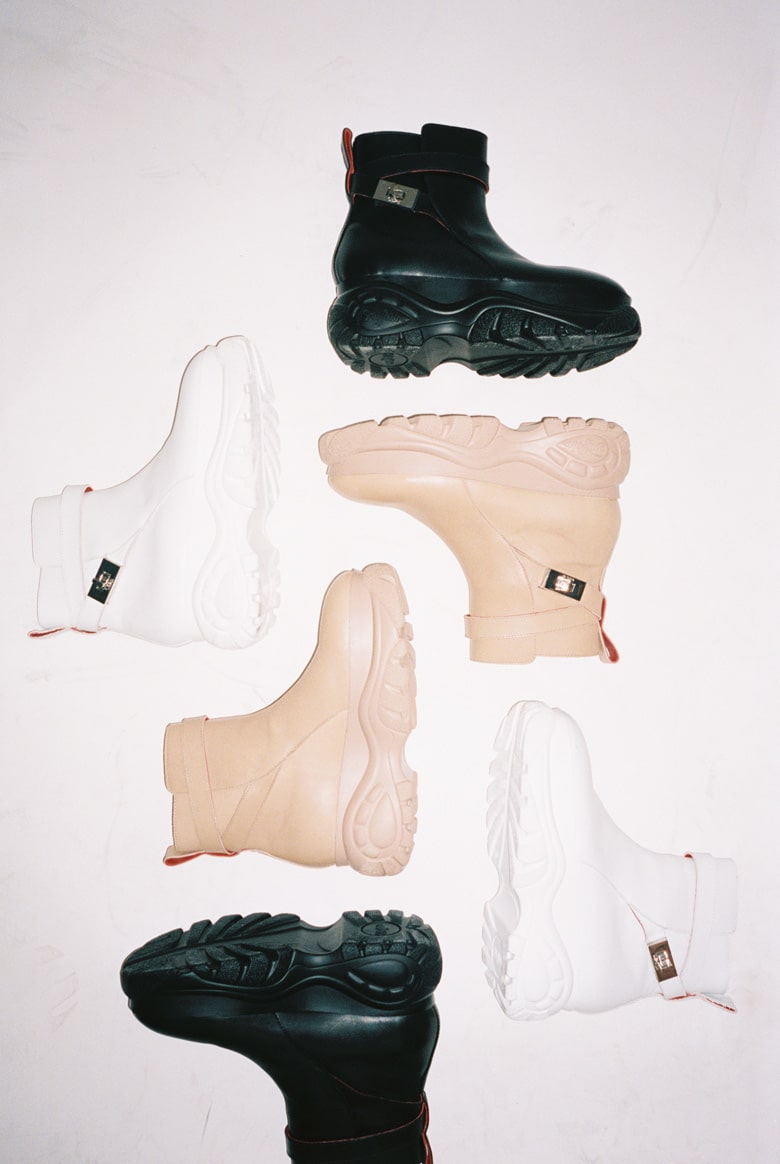Good to know: Maria Koch and the cosmos that is 032c
Let’s start at the beginning, with 032c, the contemporary culture publication founded by Berliner creative director and editor-in-chief Joerg Koch. The biannual publication devotes itself to exploring the intersections of fashion, art, and culture, while always trying to challenge and surprise its readers. Maria Koch, Joerg Koch’s partner, is an equally important part of the 032c company, as the founder and creative director of 032c Apparel. On top of an impressive career working for the likes of Jil Sander and Marios Schwab, Koch also serves as a special consultant to celebrities.
Screen Shot met with Koch in London’s smallest pub at Browns East, on the night of the global launch of the exclusive capsule of the COSMIC WORKSHOP womenswear, 032c Apparel’s first ready-to-wear womenswear collection, as well as its collaboration with Buffalo. We spoke about sustainability in fashion, our society’s dire need for balance, and what’s next for 032c.

COSMIC WORKSHOP, just like anything that 032c creates, is both rough and soft at the same time; both underground and elegant—a trait that most Berliners seem to always exude. Koch mentioned before that the collection was inspired by Berlin’s ‘hardcore’ rave kids. And it shows. Only it has an added elegant side to it. The installation at Browns East reflected that inspiration, with flashing lights and hanging plastic reminiscent of the same aesthetic my favourite clubs can sometimes have. Koch explained that the name “COSMIC WORKSHOP comes from two words. We named our office ‘032c workshop’, which is the space where we work. And for ‘cosmic’, when I was a rave kid, there was this super kitsch musician called Cosmic Baby who used whale sounds and other sounds, and I was always very attracted to this word ‘cosmic’ even though I’m not that spiritual. I was attracted to the idea of what it could be, and this is what this collection is about.” On its website, 032c describes itself as a “manual for freedom, research and creativity,” and this collection, just like anything else that the 032c team creates, aims to do just that—educate people on fashion, Berlin’s rave scene, and sustainability.

Recently, talks surrounding sustainability have taken centre stage in the fashion industry. Just before London Fashion Week, Extinction Rebellion’s asked people to boycott LFW. It didn’t work, and only divided the fashion industry instead of changing anything, but the message was clear—something needs to change. We asked Koch about her opinion on the matter and if 032c Apparel is sustainable. “I think sustainability in the fashion industry is a need when you take the world we live in somewhat seriously. I’m not saying everyone should become this ‘typical’ organic person, but everyone should act smart and be conscious.”
COSMIC WORKSHOP is sustainable, at least as sustainable as it can be, Koch explains, “I used to teach a design strategy master’s program in sustainability within fashion and what I’ve learned while teaching it is that there are so many different ways to achieve it, so actually it’s not that you can do it completely right but you can definitely do a lot of steps to make sustainability possible in your own little world.” Koch’s approach to sustainability is honest and realistic, as she wants to educate buyers on what needs to be done instead of using big words to delude them. COSMIC WORKSHOP represents the same idea condensed into a collection, the idea that no one needs a 120-piece collection four times a year. Instead, she wants to give buyers classic, strong, and lasting items.
The attitude 032c has with its brand, its magazine, and its events is one that encourages people to slow down. While Koch understands and admires the world we live in, “I’m completely into the idea of this tempo that we live in, this ‘asap-ness’ and how attractive it has become,” she also knows that we will need to delay that rhythm. On social media platforms, such as Instagram, we feel the need to post daily pictures of new clothes. Everyone seems to be celebrating that ‘hustle culture’ we’re forced to give into. The fashion industry itself struggles with keeping pace. Everything is going too fast, and a balance is urgently needed. Koch explained that “We’re also living in this antithesis of going to the countryside, of calming down, but maybe in the future, it will all balance itself out, because right now it’s just too hardcore. You can’t do that, be non-stop full-on, and then just have a break alone. This is too radical, no?”
According to Koch, that same balance that we need in our lives should be applied to the fashion industry. Recently, sustainability has been presented to us under the model of rental fashion. Rental fashion companies allow customers to rent an item for a limited period of time (depending on the company) and for a cheaper price than the retail one, with many of them offering monthly subscriptions for three to four items.
Many people seem to think that rental fashion could be the radical idea we needed to change the industry, and that soon ownership will be old news and we’ll live in a sharing economy. While this idea seems promising, Koch argues that “clothes are so intimate; how they smell, how they’ve been washed and with what kind of soap. I have a very sensitive nose, so I wouldn’t be happy with another soap or another smell. I understand the idea of second-hand clothing, because in that case, you make something more ‘your own’.” To her, rental fashion is not personal enough to represent the future of fashion.
So what does the future of fashion consist of for Maria Koch? Digital clothing seems to be the one. She revealed to Screen Shot that 032c is currently working on a new project. “We’re looking at the idea of this need on Instagram to always have a new outfit. Would it be possible to replace these outfits that people only wear once with outfits that people buy online and would then appear on one of their Instagram pictures? That means that when you go back to creating clothes, these clothes should be much more sustainable, as they would represent something that you would wear for much longer since people probably won’t need those ‘special pieces’ anymore.”
Koch’s plan is as well thought through as 032c magazine’s curated content. It all correlates; her COSMIC WORKSHOP collection, the need for sustainability, digital clothing, and the future of fashion.






